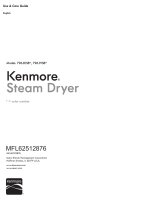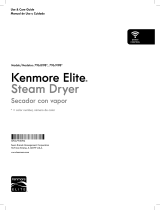
13
KENMORE APPLIANCE WARRANTY
PROTECTION AGREEMENTS
Master Protection Agreements
Congratulations on making a smart purchase. Your new Kenmore
®
product is designed and manufactured for years of dependable
operation.
But like all products, it may require preventive maintenance or
repair from time to time. That’s when having a Master Protection
Agreement can save you money and aggravation.
The Master Protection Agreement also helps extend the life
of your new product. Here’s what the Agreement* includes:
Parts and labor needed to help keep products operating properly
under normal use, not just defects. Our coverage goes well
beyond the product warranty. No deductibles, no functional
failure excluded from coverage—real protection.
Expert service by a force of more than 10,000 authorized Sears
service technicians, which means someone you can trust will be
working on your product.
Unlimited service calls and nationwide service, as often as you
want us, whenever you want us.
– replacement of your covered product if four or more product
failures occur within twelve months.
Product replacement if your covered product can’t be xed.
Annual Preventive Maintenance Check at your request –
no extra charge.
Fast help by phone – we call it Rapid Resolution – phone support
from a Sears representative on all products. Think of us as a
“talking owner’s manual.”
Power surge protection against electrical damage due
to power uctuations.
Rental reimbursement if repair of your covered product takes
longer than promised.
25% discount o the regular price of any non-covered repair
service and related installed parts.
Once you purchase the Agreement, a simple phone call is all
that it takes for you to schedule service. You can call anytime
day or night, or schedule a service appointment online.
The Master Protection Agreement is a risk free purchase. If you
cancel for any reason during the product warranty period, we
will provide a full refund. Or, a prorated refund anytime after the
product warranty period expires. Purchase your Master Protection
Agreement today! Some limitations and exclusions apply.
For prices and additional information in the U.S.A., call
1-800-827-6655. *Coverage in Canada varies on some items.
For full details, call Sears Canada at 1-800-361-6665.
Sears Installation Service
For Sears professional installation of home appliances, garage
door openers, water heaters, and other major home items,
in the U.S.A. or Canada, call 1-800-4-MY-HOME
®
.
KENMORE LIMITED WARRANTY
FOR ONE YEAR from the date of sale this appliance is warranted
against defects in material or workmanship when it is correctly
installed, operated, and maintained according to all supplied
instructions.
WITH PROOF OF SALE, a defective appliance will receive free
repair or replacement at option of seller.
For warranty coverage details to obtain free repair or
replacement, visit the web page: www.kenmore.com/warranty.
This warranty applies for only 90 DAYS from the sale date in the
United States, and is void in Canada, if this appliance is ever used
for other than private household purposes.
This warranty covers ONLY defects in material and
workmanship, and will NOT pay for:
1. Expendable items that can wear out from normal use, including
but not limited to lters, belts, bags, or screw-in base light
bulbs.
2. A service technician to clean or maintain this appliance, or to
instruct the user in correct appliance installation, operation, and
maintenance.
3. Service calls to correct appliance installation not performed
by Sears authorized service agents, or to repair problems with
house fuses, circuit breakers, house wiring, and plumbing or gas
supply systems resulting from such installation.
4. Damage to or failure of this appliance resulting from
installation not performed by Sears authorized service agents,
including installation that was not in accord with electrical, gas,
or plumbing codes.
5. Damage to or failure of this appliance, including discoloration
or surface rust, if it is not correctly operated and maintained
according to all supplied instructions.
6. Damage to or failure of this appliance, including discoloration
or surface rust, resulting from accident, alteration, abuse, misuse
or use for other than its intended purpose.
7. Damage to or failure of this appliance, including discoloration
or surface rust, caused by the use of detergents, cleaners,
chemicals, or utensils other than those recommended in all
instructions supplied with the product.
8. Damage to or failure of parts or systems resulting from
unauthorized modications made to this appliance.
9. Service to an appliance if the model and serial plate is missing,
altered, or cannot easily be determined to have the appropriate
certication logo.
DISCLAIMER OF IMPLIED WARRANTIES; LIMITATION
OF REMEDIES
Customer’s sole and exclusive remedy under this limited warranty
shall be product repair or replacement as provided herein. Implied
warranties, including warranties of merchantability or tness
for a particular purpose, are limited to one year or the shortest
period allowed by law. Seller shall not be liable for incidental
or consequential damages. Some states and provinces do not
allow the exclusion or limitation of incidental or consequential
damages, or limitation on the duration of implied warranties of
merchantability or tness, so these exclusions or limitations may
not apply to you.
This warranty applies only while this appliance is used in the
United States or Canada*.
This warranty gives you specic legal rights, and you may also
have other rights which vary from state to state.
* In-home repair service is not available in all Canadian
geographical areas, nor will this warranty cover user or servicer
travel and transportation expenses if this product is located
in a remote area (as dened by Sears Canada Inc.) where an
authorized servicer is not available.
Sears Brands Management Corporation
Homan Estates, IL 60179
Sears Canada Inc.
Toronto, Ontario, Canada M5B 2C3
10/2014
















